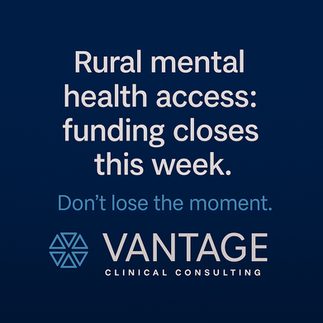
Vantage Policy Watch Week of October 20, 2025
- jameliahand
- Oct 20, 2025
- 3 min read
Continuity in Care Amid Federal Restructuring
As federal appropriations remain stalled and agency restructuring continues, continuity of behavioral health and addiction treatment services has never been more critical. This week, both providers and payers must prepare for shifting rules and uncertain funding, while local and state systems begin filling gaps once managed at the federal level.
This Week’s Key Developments
1. Government Shutdown Continues- The shutdown that began October 1 remains unresolved. Behavioral health block grants, peer and prevention funding, and new award notifications remain delayed. Federal staff furloughs at HHS and SAMHSA are slowing approvals and reimbursements, leaving providers uncertain about Q4 payments and oversight.
2. Workforce Shortage Becomes Critical- San Diego County announced a $75 million investment to address its mental health workforce crisis, showing that local governments are stepping up where federal systems have stalled. Other states are expected to follow with similar workforce investments.
3. ARPA Funds Sunsetting Nationwide- Houston’s mental health crisis and co-response programs are at risk as COVID-era ARPA funding expires. Many localities that built crisis response capacity with temporary grants are now facing layoffs or closures unless they find new funding.
4. Governors Launch Public Health Alliance- Fifteen Democratic governors have formed a state-level Public Health Alliance to coordinate policy, outbreak response, and funding. This bloc may redefine how states manage behavioral health infrastructure, signaling a shift from federal to state control.
5. Rural Health Grant Window Closing- The federal rural health funding opportunity closes this week. With behavioral health access weakest in rural areas, this is a final call for community-based organizations and treatment centers to apply.
Medicaid and Federal Agency Updates
Medicaid Changes
Starting in 2027, all states will be required to implement work requirements for adult Medicaid recipients.
CMS issued updated guidance clarifying that federal financing for emergency Medicaid services only covers direct treatment costs. Managed-care capitation payments will not qualify.
Some states are already cutting Medicaid programs in anticipation of federal budget reductions, creating new access barriers for behavioral health patients.
A federal judge struck down a CMS rule on how states fund their share of Medicaid, leaving uncertainty around state provider-tax arrangements and future funding models.
Federal Agency Restructuring
The Department of Health and Human Services continues its reorganization, consolidating multiple offices and planning to merge SAMHSA functions into a new entity under the proposed Administration for a Healthy America.
CMS has temporarily paused or delayed some Medicare and telehealth claim payments during the shutdown, signaling potential backlogs even after government reopening.
Vantage Take
Continuity of care now depends on local strategy, not federal stability. The behavioral health system is in a period of fragmentation where the rules are shifting, and the safety net is uneven. Providers who plan early, diversify funding, and align with state alliances will be better equipped to withstand these changes.
Vantage’s recommendation:
Reassess dependencies on federal funding streams.
Identify state or local programs that can serve as fallback mechanisms.
Track new guidance from CMS, OCR, and state Medicaid offices weekly.
Strengthen cross-sector partnerships that secure continuity for clients and staff.
How Vantage Can Help
Vantage Clinical Consulting LLC helps organizations remain stable and compliant during federal transitions.
✅ Grant and Program Continuity Planning – Assessing risk exposure and creating contingency plans to protect essential operations when funds are delayed or reduced.
✅ Compliance and Oversight Readiness – Ensuring organizations stay aligned with SAMHSA, CMS, JCAHO, and OCR expectations, including 42 CFR Part 2 privacy standards.
✅ Medicaid Resilience Planning – Mapping service and reimbursement dependencies to minimize disruption from new work requirements or rule changes.
✅ State and System Partnership Development – Supporting collaboration with new public health alliances and helping providers integrate with state networks.
✅ Workforce Retention and Training – Building workforce stability through recovery support consultation, peer development, and strategic planning.
Continuity is the new compliance. Contact Vantage Clinical Consulting LLC to protect your operations and ensure uninterrupted access to care.












Comments